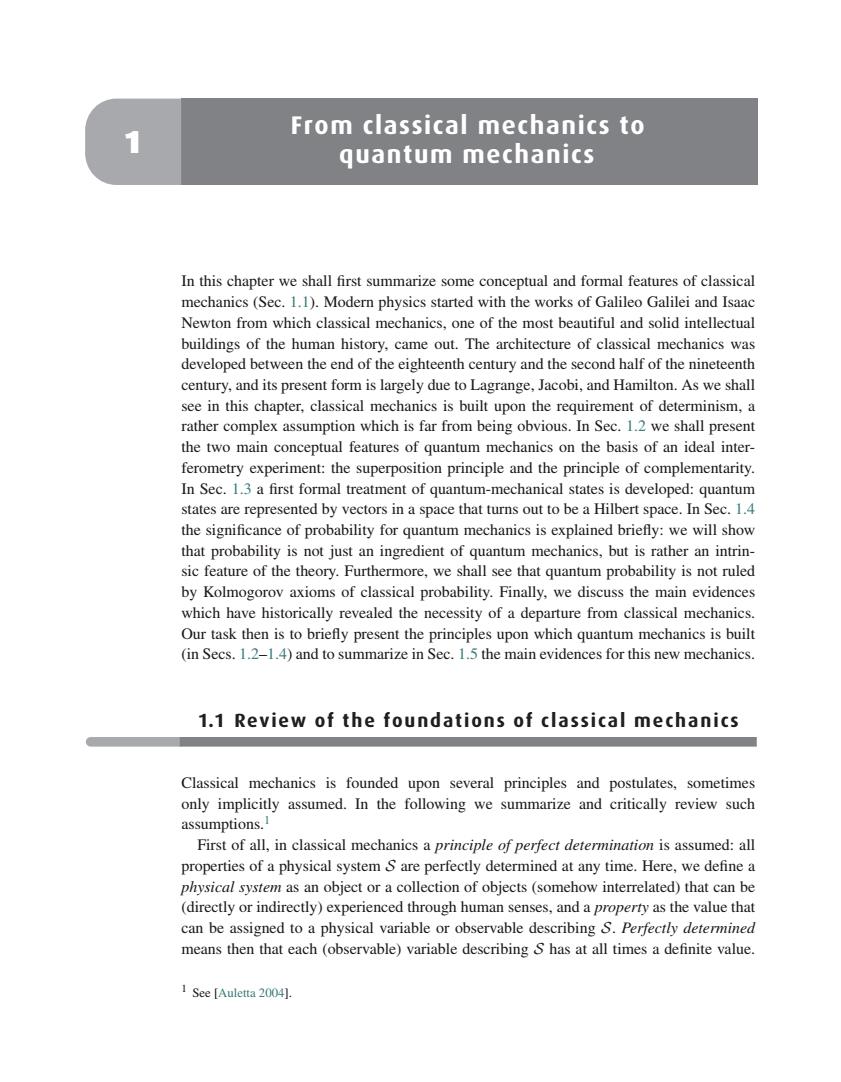正在加载图片...

From classical mechanics to quantum mechanics In this chapter we shall first summarize some conceptual and formal features of classical mechanics(Sec.1.1).Modern physics started with the works of Galileo Galilei and Isaac Newton from which classical mechanics,one of the most beautiful and solid intellectua buildings of the human history,came out.The architecture of classical mechanics was developed between the end of the eighteenth century and the second half of the nineteenth century,and its present form is largely due to Lagrange,Jacobi,and Hamilton.As we shall tof determinism,a rather complex assumption which is far from being obvious.In Sec.1.2 we shall present the two main conceptual features of quantum mechanics on the basis of an ideal inter- ferometry experiment:the superposition principle and the principle of complementarity. In Sec.1.a first formal treatment of quantum-mechanica states is developed: quantu states are represented by vectors in a space that turns out to be a Hilbert space.In Sec.1.4 the significance of probability for quantum mechanics is explained briefly:we will show that probability is o just an ofu mechanics.but an sic feature of the theory.Fur thermore,we shall see m probability is not ruled by Kolmogorov axioms of classical probability.Finally,we discuss the main evidences which have historically revealed the necessity of a departure from classical mechanics. Our task then is to briefly present the principles upon which quantum mechanics is built (in Secs.1.2-1.4)and to summarize in Sec.1.5 the main evidences for this new mechanics 1.1 Review of the foundations of classical mechanics Classical mechanics is founded upon several principles and postulates.sometime only implicitly assumed.In the following we summarize and critically review such assumptions. First of all,in classical mechanics a principle of perfect determination is assumed:all properties of a pysical systemare determined at any time.Here.we define physical system as an object or a collection of objects (somehow interrelated)that can be (directly or indirectly)experienced through human senses,and a property as the value that can be assigned to a physical variable or observable describing S.Perfectly determined means then that each observable)variable describing S has at all times a definite value 1 See [Auletta 20041.1 From classical mechanics to quantum mechanics In this chapter we shall first summarize some conceptual and formal features of classical mechanics (Sec. 1.1). Modern physics started with the works of Galileo Galilei and Isaac Newton from which classical mechanics, one of the most beautiful and solid intellectual buildings of the human history, came out. The architecture of classical mechanics was developed between the end of the eighteenth century and the second half of the nineteenth century, and its present form is largely due to Lagrange, Jacobi, and Hamilton. As we shall see in this chapter, classical mechanics is built upon the requirement of determinism, a rather complex assumption which is far from being obvious. In Sec. 1.2 we shall present the two main conceptual features of quantum mechanics on the basis of an ideal interferometry experiment: the superposition principle and the principle of complementarity. In Sec. 1.3 a first formal treatment of quantum-mechanical states is developed: quantum states are represented by vectors in a space that turns out to be a Hilbert space. In Sec. 1.4 the significance of probability for quantum mechanics is explained briefly: we will show that probability is not just an ingredient of quantum mechanics, but is rather an intrinsic feature of the theory. Furthermore, we shall see that quantum probability is not ruled by Kolmogorov axioms of classical probability. Finally, we discuss the main evidences which have historically revealed the necessity of a departure from classical mechanics. Our task then is to briefly present the principles upon which quantum mechanics is built (in Secs. 1.2–1.4) and to summarize in Sec. 1.5 the main evidences for this new mechanics. 1.1 Review o f the founda tions o f classical mechanics Classical mechanics is founded upon several principles and postulates, sometimes only implicitly assumed. In the following we summarize and critically review such assumptions.1 First of all, in classical mechanics a principle of perfect determination is assumed: all properties of a physical system S are perfectly determined at any time. Here, we define a physical system as an object or a collection of objects (somehow interrelated) that can be (directly or indirectly) experienced through human senses, and a property as the value that can be assigned to a physical variable or observable describing S. Perfectly determined means then that each (observable) variable describing S has at all times a definite value. 1 See [Auletta 2004]